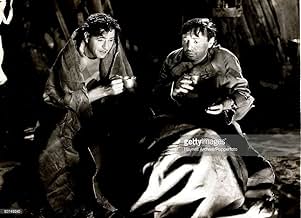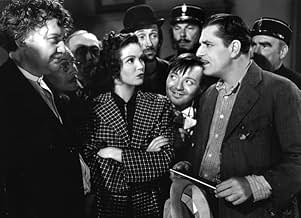After saving a tramp from suicide, a millionaire takes his clothing and disappears. Word is out that he will give a million francs to anyone who is kind to a tramp.After saving a tramp from suicide, a millionaire takes his clothing and disappears. Word is out that he will give a million francs to anyone who is kind to a tramp.After saving a tramp from suicide, a millionaire takes his clothing and disappears. Word is out that he will give a million francs to anyone who is kind to a tramp.
Featured reviews
"I'll Give a Million" is silly escapist film. It's based on a 1935 Italian film and is, inexplicably, set in France. When the film begins, Tony (Warner Baxter) is aboard his huge yacht. However, despite his wealth, he doesn't particularly love his life...and this is apparent when he jumps overboard to save a drowning hobo, Louis (Peter Lorre). The folks aboard the boat don't realize he's jumped and Tony swims ashore with his new friend. But as I said, he didn't love his life and instead of going to the nearest authorities to tell them who he is, he dons Louis' clothes and decides to be a hobo!
In the meantime, Louis comes into town in a tux and a wad of cash and is a sensation. He informs everyone it's from his millionaire benefactor and the same man had told him he was tired of phonies and would give 1,000,000 francs if someone just did something nice for him without expectation that they'd ever get paid back. After telling the press this story, it makes the newspaper and suddenly everyone in town is being super-nice to all the hobos! In the meantime, Tony has met a lovely woman, Jean (Marjorie Weaver) and she's taken him under her wing at the circus. What's next? See the film.
I sure would love to find a copy of the original Italian film because the American version is very enjoyable and I'd love to see how good the first version is. Regardless, nice acting and a cute story make this one worth your time.
In the meantime, Louis comes into town in a tux and a wad of cash and is a sensation. He informs everyone it's from his millionaire benefactor and the same man had told him he was tired of phonies and would give 1,000,000 francs if someone just did something nice for him without expectation that they'd ever get paid back. After telling the press this story, it makes the newspaper and suddenly everyone in town is being super-nice to all the hobos! In the meantime, Tony has met a lovely woman, Jean (Marjorie Weaver) and she's taken him under her wing at the circus. What's next? See the film.
I sure would love to find a copy of the original Italian film because the American version is very enjoyable and I'd love to see how good the first version is. Regardless, nice acting and a cute story make this one worth your time.
20th Century-Fox did this Hollywood remake of a 1935 Italian film of the same translated title, the setting switched to the South of France, featuring a cast filled with contract players led by Warner Baxter ("The Prisoner of Shark Island"). His character, Tony Newlander, is the millionaire tiring of the sycophants around him, none of whom he can rely on as a trusted friend, who rescues a drowning man known as Louie 'The Dope' Monteau (Peter Lorre), a homeless derelict. Tony would be happy just to find one person who could befriend him without the promise of monetary gain, leaving Louie a million dollars for his troubles. Once the newspapers publish a story claiming that a millionaire is masquerading as a bum, a fortune awaiting the person who shows him any kindness, the entire city is quickly overrun with derelicts looking for handouts, while Tony finds himself falling for an impoverished circus performer (Marjorie Weaver) with a trained chimp named Darwin, who excels at judo and cigarette smoking. Amidst the Moto series, Peter Lorre thoroughly enjoys this comic change of pace, joined in mischief during the latter stages by John Carradine's Kopelpeck, resplendent in top hat and cane. Among the many familiar faces are Fritz Feld, Jean Hersholt as a clown, and Frank Reicher as the Prefect of Police, who himself takes in a bum off the street and ends up getting robbed.
This film starts out with great promise. Tony (Warner Baxter) is a wealthy man, out on his yacht, who suddenly becomes aware that everybody onboard is just nice to him because of his money. As he stands leaning over the railing of the yacht, pondering this fact, he notices a man yelling for help, apparently drowning in the ocean. His yells of man overboard are not heard, so he jumps in and rescues the man. The yacht is out of range, so he swims to shore with Louis (Peter Lorre) in tow.
They camp on the beach for the night, and Tony tells Louis that if he could find just one person who was nice to him and not expecting a payout that he would give that person one million francs (today one dollar = 5 francs). The next day Louis awakens and finds Tony gone but his clothes and money still there. He goes into town wearing Tony's clothes and spending Tony's money. This gets the attention of the police, where Louis tells the story of the rich man, incognito dressed like a tramp, who will give one million francs to anybody who does a good deed for him with no expectations of reward. Soon everybody is being nice to all of the hobos. Meanwhile, Tony has become friends with a woman in a circus who knows nothing about this . Complications ensue.
Now all of this sounds pretty good, but it just seems to bog down a bit after Tony and Louie separate. A 1930s Fox screwball comedy is a rarity, and there is a reason for that. This would have been even better and probably ringed a bit truer if it had been made over at Warner Brothers, retaining the natural performance of Baxter as the millionaire and Lorre as the impish tramp and maybe using some of Warners' great contract players to fill in the blanks.
Still, it is funny and like "My Man Godfrey" has something to say about how your pocketbook often dictates your treatment by your fellow man towards the end of the Great Depression. A rare message-comedy from Fox.
They camp on the beach for the night, and Tony tells Louis that if he could find just one person who was nice to him and not expecting a payout that he would give that person one million francs (today one dollar = 5 francs). The next day Louis awakens and finds Tony gone but his clothes and money still there. He goes into town wearing Tony's clothes and spending Tony's money. This gets the attention of the police, where Louis tells the story of the rich man, incognito dressed like a tramp, who will give one million francs to anybody who does a good deed for him with no expectations of reward. Soon everybody is being nice to all of the hobos. Meanwhile, Tony has become friends with a woman in a circus who knows nothing about this . Complications ensue.
Now all of this sounds pretty good, but it just seems to bog down a bit after Tony and Louie separate. A 1930s Fox screwball comedy is a rarity, and there is a reason for that. This would have been even better and probably ringed a bit truer if it had been made over at Warner Brothers, retaining the natural performance of Baxter as the millionaire and Lorre as the impish tramp and maybe using some of Warners' great contract players to fill in the blanks.
Still, it is funny and like "My Man Godfrey" has something to say about how your pocketbook often dictates your treatment by your fellow man towards the end of the Great Depression. A rare message-comedy from Fox.
In the heart of the Depression, moviegoers needed screwball comedies to cheer themselves up for a quarter. In that vein, they were heartily treated to some of the best comedy of all time from Laurel and Hardy to Frank Capra. This film is tn that tradition. Similar to Mr. Deeds Goes to Town and Sullivan's Travels in the sense that a powerful person is living as a common man among the masses of the poor, the film has a certain charm that is no longer found in films after the Golden Age of Hollywood. Fortunately, we have Youtube to access some of these gems from the past. Lots of fun.
An amiable, workmanlike farce that's like "My Man Godfrey" without the archness, this Hollywood studio product has an unusually European flavor, perhaps due to the number of newly arrived Holocaust refugee actors in its cast. Especially worth seeing for Peter Lorre's engaging turn as a kittenish hobo.
Did you know
- Trivia"I'll Give a Million" was based on a 1936 film of the same name with Vittorio De Sica, whom Fox unsuccessfully tried to recruit for this remake.
- GoofsWarner Baxter was 5'11", Peter Lorre was 5'3", yet there exchanged clothing fit each other perfectly.
- ConnectionsRemake of I'll Give a Million (1935)
Details
- Release date
- Country of origin
- Language
- Also known as
- Džentlmen skitnica
- Filming locations
- Production company
- See more company credits at IMDbPro
- Runtime
- 1h 10m(70 min)
- Color
- Aspect ratio
- 1.37 : 1
Contribute to this page
Suggest an edit or add missing content







































